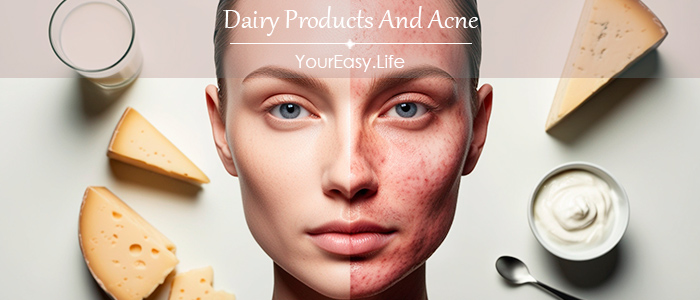If acne has become a constant companion, it can truly be a challenge, especially during adolescence when you want to look your best, but annoying pimples suddenly appear on your skin. This raises an important question: can dairy products and acne be related? In the world of dietetics and dermatology, there are lively debates on this topic, and, perhaps, you’re curious to know how dairy products and acne are connected. In this article, we’ll talk about whether you can eat dairy products if you have acne, how they might influence your skin, and what you can do to minimize their negative impact.
Table Of Contents
What Is Acne?
Acne is not just a teenage problem that most of us face during our growth years. It’s a skin condition that can occur at any age and is associated with the overproduction of sebum and clogged pores. When the skin’s sebaceous glands produce too much oil, the pores can become blocked, creating an ideal environment for bacteria to thrive, leading to inflammation and the appearance of pimples, blackheads, and other blemishes.
But acne is not just a cosmetic issue. It can affect self-esteem and confidence, causing emotional discomfort. That’s why it’s so important to understand what causes acne and how to effectively combat it. Our skincare habits, diet, and even stress levels can play a significant role in this process. That’s why understanding what causes acne and how dairy products and acne might be linked is so important in finding effective ways to combat it.
At YourEasy.Life, we believe that acne can be managed, and the key to doing so lies not only in proper skincare but also in a holistic approach to overall health.
Dairy Products and Acne: Harm or Benefit?
When it comes to dairy products, many of us immediately think of the benefits. After all, milk, yogurt, cheese — these are sources of calcium, protein, and other essential nutrients. But when it comes to acne, things are not so simple. Dairy products and acne can play a dual role. On the one hand, they provide the body with necessary elements, but on the other hand, they can exacerbate inflammatory processes in the skin.
“But how is this possible?”
Consuming milk can lead to skin breakouts because it contains sex hormones like androgens, as well as steroids and non-steroidal growth factors. Research shows that milk proteins, especially casein and whey protein, can stimulate an increase in insulin-like growth factor-1 (IGF-1) and insulin levels in the body. Both of these hormones play a role in the development of acne, as they can increase sebum production and stimulate skin cell proliferation, which creates favorable conditions for bacterial growth, leading to clogged pores and inflammation. This is why some people may experience worsening acne when consuming dairy products. Moreover, elevated insulin levels can affect hormonal balance, which may also exacerbate acne.
If you think this is just a theory, you’d be mistaken. There are scientific studies that confirm the link between dairy products and acne. For example, a study published in the “Journal of the American Academy of Dermatology” found that teenagers who consumed more dairy products were more likely to experience acne. Other studies suggest that IGF-1 in milk may play a key role in the development of acne.
Which Dairy Products Most Affect Acne?
Now, let’s talk more specifically about which dairy products may have the most negative impact on acne. It all depends on their composition and processing.
- Milk and yogurt high in fat and sugar: These products can be particularly challenging for your skin, as not only fat but also added sugar can stimulate inflammatory processes. If you’re prone to acne, it might be worth paying attention to the composition of these products.
- Cheese: Cheese is a favorite for many, but it can also impact skin health. High-fat, aged cheeses can stimulate inflammation and contribute to sebum production, so the link between dairy products and acne extends to foods like cheese, too. Some studies suggest that cheese may be linked to worsening acne, especially in teenagers. The link between dairy products and acne extends to products like cheese.
- Fermented dairy products: For example, kefir and unsweetened yogurt with low-fat content can be beneficial as they contain probiotics that improve gut flora. A healthy gut is one of the keys to clear skin. So if you can’t give up dairy, choose products with minimal fat and sugar.
“But what if dairy products are a significant part of my diet?”
If you can’t imagine your day without milk or cheese, try switching to lighter alternatives. For example, consider transitioning to plant-based alternatives like almond or oat milk. This could be a good compromise, especially if you notice that your skin condition worsens after consuming regular dairy products.

Practical Tips: How to Approach Your Diet When You Have Acne
- Observe your skin. If you notice that your skin worsens after consuming certain dairy products, try eliminating them for a few weeks and see if the situation improves.
- Choose low-fat, low-sugar options. If you can’t fully give up dairy, try to choose products with minimal fat and sugar content. Unsweetened kefir or yogurt can be great alternatives.
- Consider alternatives. Plant-based milk and cheese alternatives can be a good substitute. Try almond, coconut, or oat milk — many of them are fortified with calcium and vitamins, so you won’t miss out on nutrients.
- Don’t forget about probiotics. Fermented dairy products without added sugar can be beneficial for your gut and, therefore, your skin. If you can’t drink regular milk or other dairy products, try adding kefir or yogurt with probiotics to your diet.
“But what if changes in diet don’t help?”
If you’ve tried changing your diet but are still struggling with acne, it might be time to consult a dermatologist. Remember, diet is just one factor that affects skin health. Stress, hormonal changes, and improper skincare can also play a role.
Conclusion
Dairy products and acne — this is a topic that requires an individualized approach. They may not be the primary cause but can exacerbate the problem. It’s important to listen to your body and not be afraid to experiment with your diet. Try eliminating dairy products for a while and observe the results. And remember, you always have support — YourEasy.Life is here to help you find the best solutions for your skin health and overall well-being.
Scientific Research, Data And Articles
- Danby, F. W. (2005). Acne and milk, the diet myth, and beyond.
- Adebamowo, C. A., Spiegelman, D., Berkey, C. S., Danby, F. W., Rockett, H. H., Colditz, G. A., & Willett, W. C. (2005). Milk consumption and acne in teenaged boys.
- Adebamowo, C. A., Spiegelman, D., Berkey, C. S., Danby, F. W., Rockett, H. H., Colditz, G. A., & Willett, W. C. (2006). Milk consumption and acne in adolescent girls.





